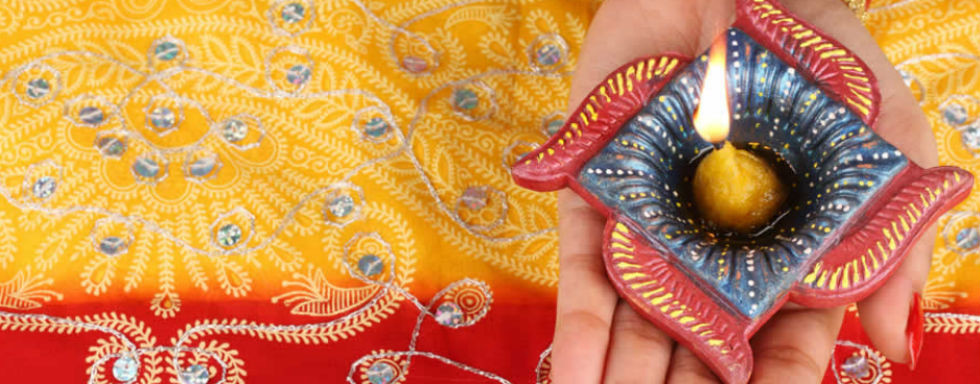India is a land of festivals. Diwali, the Festival of Lights, is celebrated with fervor and gaiety. The festival is celebrated by young and old, rich and poor, throughout the country to dispel darkness and light up their lives. The festival symbolizes unity in diversity as every state celebrates it in its own special way.
The celebration of the four-day festival commences on Aswayuja Bahula Chaturdasi and concludes on Kartika Shudda Vijiya. The first day of the festival Naraka Chaturdasi marks the vanquishing of the demon Naraka by Lord Krishna and his wife Satyabhama.
'Puranas' have it that Naraka, son of Bhudevi, acquired immense power from a blessing given by Lord Brahma after a severe penance. He soon unleashed a reign of terror in the kingdom of Kamarupa, harassing celestial beings with his invincible might. Unable to bear the tyranny of the demon, the celestial beings pleaded with Lord Krishna to save them from his torture.
But Naraka could not be easily killed as he had a boon that he would face death only at the hands of his mother Bhudevi. So, Krishna asks his wife Satyabhama, the reincarnation of Bhudevi, to be his charioteer in the battle with Naraka.
When Krishna feigns unconsciousness after being hit by an arrow of Naraka, Satyabhama takes the bow and aims the arrow at Naraka, killing him instantly. Later Lord Krishna reminds her of the boon she had sought as Bhudevi. The slaying of Naraka by Sathyabhama could also be taken to interpret that parents should not hesitate to punish their children when they stray on to the wrong path. The message of Naraka Chaturdasi is that the good of the society should always prevail over one's own personal bonds.
The second day is Amavasya when Lakshmi puja is performed. It is believed that on this day Goddess Lakshmi would be in her benevolent mood and fulfill the wishes of her devotees. One version says that it was on this day that Goddess Lakshmi emerged from Kshira Sagara (Ocean of Milk) when the Gods and demons were churning the sagara (ocean) for nectar (Amrit)
The other version is that when Lord Vishnu in the guise of Vamana, sought three feet of land from the generous demon king Bali, the latter had to surrender his head as Vamana had conquered the earth and the sky in two strides. Lord Vishnu banishes Bali into the Pathala Loka (netherland) by keeping his third stride on Bali's head. Later, pleased by his generosity, Lord Vishnu grants him a boon and he in turn requests the Lord to guard his palace at Pathala Loka.
Meanwhile, the Goddess is unable to bear the separation and her grief affects the functioning of the entire universe. Brahma and Lord Shiva offer themselves as guards and plead with Bali to relieve Vishnu. So, on the Amavasya day, Lord Vishnu returns to his abode and Goddess Lakshmi is delighted. It is believed that those who worship Goddess Lakshmi on this day would be bestowed with all the riches.
The third day is "Kartika Shudda Padyami." On this day Bali would come out of Pathala Loka and rule Bhuloka as per the boon given by Lord Vishnu. Hence, it is also known as "Bali Padyami".
The fourth day is referred to as "Yama Dvitiya." On this day, sisters invite their brothers to their homes.
However, in the northern part of India it is celebrated as the return of Ram along with Sita and Lakshman from his 14 years of exile after killing Ravana. To commemorate his return to Ayodhya, his subjects illuminated the kingdom and burst crackers. For the Gujaratis, Marwaris and other business community Diwali marks the worship of Goddess Lakshmi and also the beginning of the new financial year.
For Bengalis, it is the time to worship Goddess Kali or Durga. The Goddess Durga continued her "Vilaya Tandava" even after killing demon Mahishasura.
